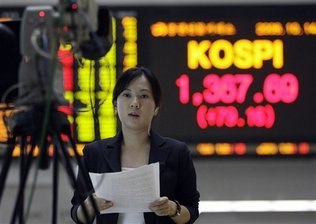
|  |  |  Business News | October 2008 Business News | October 2008  
World Stocks Soar as Credit Markets Ease
 Pan Pylas - Associated Press Pan Pylas - Associated Press
go to original


| | A South Korean journalist reports the jumping Korean benchmark stock index at the Korea Stock Exchange in Seoul, South Korea, Tuesday, Oct. 14, 2008. Asian markets soared for a second day Tuesday, led by a stunning 14 percent jump in Tokyo, after Wall Street rallied from its worst week ever on optimism for government rescue efforts. (AP) | | |
London - Stock markets in Europe and Asia rose strongly for a second straight day Tuesday after Wall Street rallied from its worst week ever on mounting evidence that government attempts to shore up the world's battered financial system are beginning to thaw frozen credit markets.

The gains on Europe's markets came in the wake of the strongest ever daily performance on Japan's benchmark Nikkei 225 index, which surged 1,171.14 points, or 14.15 percent, to close at 9,447.57. Tokyo financial markets were playing catch-up to recent developments because they were closed Monday for a holiday.

In London, the FTSE 100 index of leading shares was up 255.08 points, or 6.0 percent, at 4,511.98, despite news that inflation in Britain is running at a 16-year high. Germany's DAX was up 257.46, or 5.1 percent, at 5,319.91 even though a group of leading German economic think tanks said Tuesday that Europe's largest economy is on the "brink of a recession".

The CAC-40 in France was 199.21 points, or 5.6 percent, stronger at 3,730.71.

Wall Street closed 11 percent higher Monday, its biggest daily jump since 1933, and is expected to open solidly later. Dow Jones industrial average futures rose 176, or 1.85 percent, to 9,684.

The resurgence in the markets followed the announcement Monday by European government of euro1.7 trillion set of national packages to save ailing banks, and the confirmation that the U.S. will follow suit and buy stakes in nine U.S. financial institutions.

Late Monday in the U.S., government officials and industry executives said the Bush administration would use US$250 billion of the US$700 billion bailout program recently passed by Congress to buy into American banks. The government initially will buy stock of nine large banks, but the program is expected to be expanded to many others.

U.S. President George W. Bush planned to announce the details before Wall Street opens.

"Investors are viewing the bailouts positively and are betting that the state action will ease the credit crisis," said Sejal Patel, a trader at CMC Markets.

The long-term key is whether the flurry of activity can actually break the logjam in credit markets and the early indications are that there has been some easing in rates and spreads.

The interbank lending rate for three-month euro loans, known as the Euro Interbank Offered Rate, or Euribor, fell 0.08 percentage points to 5.24 percent from 5.32 percent the day before. Rates had fallen on Monday as well, but by a more modest 0.06 percentage points.

The equivalent dollar rate fell 0.12 percent to 4.64 percent, while pound rates are 0.02 percent down at 6.25 percent.

Though the rates are falling, the differential between the rate at which banks lend to each other and official central bank lending rates remain high, signalling a strong degree of mistrust still exists. In the U.S. the base central bank rate is 1.5 percent, in the euro area it is 3.75 percent and 4.50 percent in Britain.

"It would be unrealistic to look for a quick return even to post-subprime, pre-Lehman 'normality', let alone to conditions that prevailed before the market turmoil erupted in 2007," said Stephen Lewis, an analyst at Monument Securities. U.S. investment bank Lehman Brothers Holding Inc. went bankrupt last month, accelerating the financial crisis.

Earlier, Asian governments took more steps to fortify their own financial systems, helping stock markets across the region to rally. Authorities relaxed regulations on companies buying up their own shares, a change that will help prevent takeovers and allow companies to prevent a nose-dive in their own issues.

Japan also promised to continue to protect people's insurance policies and savings accounts, and said it will consider capital injection into medium-size and small Japanese financial institutions.

And in Australia, the government announced a plan to inject 10.4 billion Australian dollars (US$7.4 billion) to strengthen the country's economy, helping send the S&P/ASX200 index 3.7 percent higher. Hong Kong promised to guarantee all bank deposits until 2010.

Hong Kong's key index ended up 3.2 percent, while South Korea's market jumped over 6 percent. The Philippine market surged more than 7 percent and Indonesia's market - shut half of last week due to dramatic declines - was up more than 6 percent.

Only China's market fell - sliding 2.7 percent.

Russia's stock markets joined the surge Tuesday, prompting regulators to suspend trading on one of the two major exchanges. The MICEX, where most of Russia's trading takes place, climbed 11.2 percent before trading was halted for an hour. The RTS climbed 6.4 percent.

U.S. stock futures were up, suggesting Wall Street would climb higher Tuesday. Dow futures advanced 51 points, or 0.5 percent, to 9,540. S&P 500 futures were up 10 points, or 1 percent, to 1,026.

Oil continued to rise, with light sweet crude for November delivery gaining US$3.39 to US$84.58 a barrel in European trade on the New York Mercantile Exchange.

In currencies, the dollar was steady on the day around the 103 yen mark, but the euro was firmer at US$1.3752. |

 |
|  |



